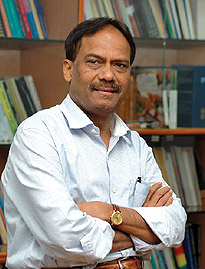 Primary Health Care to remain backbone of Health Services
Primary Health Care to remain backbone of Health Services
Dr. Jagdish Prasad
Director General of Health Services,
Government of India, Ministry of Health &
Family Welfare and Professor and Chief of Cardiac Surgery
Vardhman Mahavir Medical College & Safdarjung Hospital,
New Delhi-110029
Dr. Jagdish Prasad, Director General of Health Services was awarded “PADMA SHREE” by Government of India in the year 1991 in recognition of the pioneer work done for establishing and developing of the Specialty of Cardio-Thoracic & Vascular at Safdarjung Hospital, New Delhi and economizing the cost of cardiac surgery.
Some of his major achievements as Cardiac Surgeon, Principal, Director of VMMC & Safdarjang Hospital are that he started cardiac surgery in Safdarjang Hospital and economised the open cardiac surgery. He is credited to be the first one in the country to start the Beating Heart Coronary artery bypass surgery. He has also done the Open Heart Surgery in very sick awake patients under spinal anaesthia. He is also credited to have established state of the art Cardiac Vascular and Thoracic Surgery in Central Government Hospitals. He is the founder Principal of Vardman Mahavir Medical College.
Dr. Prasad has developed all the super specialty Departments and started post doctoral courses in all the super specialty branches in Safdarjang Hospital. He has made the significant improvement in administration in such a way that there is no union exists and no one has gone on strike during his tenure.
As DGHS, he brought many changes in National Health Programmes of the country. In an interview with Healthy India Chronicle he shares his insights on making healthy India.
Some of the major achievements under his leadership:
1. NCD programme was launched in all the Districts of the country.
2. The treatment protocol of tuberculosis programme was changed. This is going to bring down the incidence of tuberculosis to nearly zero level in coming 7 to 10 years.
3. The prophylactic drugs for leprosy was started so that leprosy could be eliminated from the country in the next four years.
4. Human resource was developed and is being strengthened in Mental Health Programme in the country.
5. Change has been brought in National Programme for Control of Blindness so as to maximize the outcome.
6. Strategic Action Plans have been suggested to Government to completely eliminate flurosis, arsenic poisoning and iodine deficiency in the country
7. A concept on developing Nature Care Hospital including Yoga in all the Districts of the country to prevent and promote the health has been proposed. Six Districts of the country have been adopted as model districts for pilot project.
8. Concept of strengthening the PHC, CHC and District Hospital has been developed.
9. Every State should have state of art Cancer Hospital to treat the cancer patients so that they need not go to other place for treatment.
10. Concept of strengthening of District Hospitals.
11. Every Medical College Hospital should be attached to one district and it will be responsibility of the college and hospital to take care of the whole district as far as the patient care is concerned.
12. To overcome the shortage of the Doctors in the country, it has been suggested to the Government that all Post Graduate Resident Doctors should be posted for six months in the rural areas as part of their training. With this concept, at a time nearly 11000 Doctors will be available for the District Hospitals
without spending Government money.
13. In my tenure as DGHS, Yaws, Polio and Guine worm have been eradicated from the country.
14. Medical curriculum for the under graduate are in process of getting new concept so that they can practice the family medicine.
15. As DGHS, he has developed the state of the art super specialty and the largest emergency block in Safdarjang Hospital.
16. Dr Jagdish Prasad was the main technical person in drafting the National Mental Health Act of the country.
Brief Journey
Dr. Jagdish Prasad, M.S., M.Ch., D.N.B., FIACS,
Dr Jagdish Prasad has done his Graduation an Post Graduation from Aiims. After he did MCH in cardiac surgery from KGS medical college Bombay. Working as chief of the cardiac surgery Safdarjung Hospital New Delhi from Oct 1985 to till now.
He was Junior Resident, Surgery at All India Institute of Medical Sciences (AIIMS), New Delhi from January 1978 to December 1980. Following which he was Registrar at AIIMS, New Delhi from April 1981 to December 1982.
He was Additional Director General of Health Services, Govt. of India.He was Special Director General of Health Services Govt. of India, M/o HFW from 14th July, 2011 till 30th November. In 2011 he took over the charge of Director General of Health Services Govt. of India, M/o HFW.
Q1. What are the main points towards making healthy India?
Ans: Time has come to go beyond the treatment of diseases through population based interventions wherein health prevention and promotion have emerged as a possible tool addressing many of the social determinants of disease. By investment in prevention of disease, promotion of good health, building knowledge for better health, we can make healthy citizen and healthy society. Today whole world is fighting with Non-communicable and communicable diseases. More than 50% of deaths happen in our country due to NCD. Early detection of NCDs not only enables the onset of treatment but prevents financial costs and sufferings. In this regard, we have launched population based prevention, screening and control programmes for five common non-communicable diseases, namely Hypertension, Diabetes, and Cancers of oral cavity, breast and cervix.
Q2. How to make health policy more patient/consumer friendly ?
Ans: About 70% of doctors are looking after 30% of the population in the urban area, whereas 30 % of doctors taking care of 70% of the population of rural areas. So we have to make the equal distribution of doctors to provide affordable and accessible health care for all. Under health policy, we are bound to give affordable health facility to all, priority will be to give the strengthening to public health infrastructures and free essential drug up to the district level. Primary health care remains the backbone of health services. We should strengthen our public health system, so that poor and needy people don’t have to look at tertiary care hospitals. Where the treatment can be done at the secondary level hospital. Every diagnostic test and treatment should be free of cost or affordable. Investment in public health sector will give lots of indirect returns and GDP of the country will go up surely.
Additionally, to address the shortage of the doctors at the primary and secondary level, we can plan that during 3 years of residency, it should be mandatory for all the Senior resident doctors to spend their 6 months time at primary health care centres with a mentor.
As we know that most
of our population is
getting treatment in
private hospital. In
this regard every
private hospital of
state should adopt
Clinical establishment
act. Government have
zero tolerance for
cuts, commissions,
unethical practices
and getting money
from establishments or
pharma companies. A
healthy health practice
by private practitioner
can make healthy India.
Q3.What is your view on Uniform Implementation of Drug & Cosmetic Act for Patient Safety in our Country and Role of CDSCO & State Drug Control Administration?
Ans: CDSCO regulates clinical trial, import and export of the drug, give licence to the drug manufacturer, medical devices and vaccines. It has a lab which tests the quality of drug before provided to the public. Whereas state Drug control administration is responsible for quality check. It’s their duty to keep eye on the drug manufactures so the quality of drug could be circulated in the public.
Q4. What is your view on MCI issues Notification Reg.Generic Drugs and your Message to Govt.Doctors & Private Practice Doctors on Generic Drugs?
Ans: A generic drug can be prescribed by the doctors when the drug manufacturers have bioavailability and bio-efficacy certificate. It should be mandatory for all the manufacturers to have their R & D system for the drug or they should get attached with other manufacturers who have R & D system.
Q5. For Making Healthy India, what is your view and Message to All Health Professionals (Doctors,Nurses,Pharmacists, Paramedicals).
Ans: My message to all health professionals that they should keep one month of their service free of the cost for poor and needy people. By this way especially doctors will be available for rural and semi rural areas. All corporate and private hospitals should adopt Clinical Establishment Act to maintain transparency in their health services.
To address
the shortage of the
doctors at primary
and secondary level, it
should be mandatory for
resident who are doing
their PG should spend
their time at primary
healthcare centres with a
mentor. By this step we
can build 15 thousand
doctors team at a time
and could use their
potential at primary
level too.
Q 6. What are DGHS plans towards making healthy India?
Ans: More than 60% of patients are getting their treatment at the private hospitals. Today the private hospitals are not controlled by any authority. I urge to all the private hospitals to follow the rule of clinical establishment act so that iagnosis and treatment can be done as per requirement and exploitation of the patients can be avoided.



















